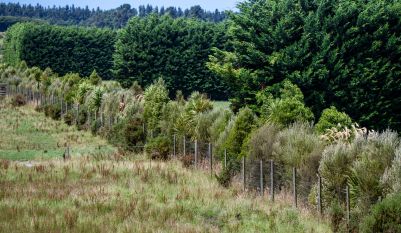Building Resilience: Sustainable and Regenerative Land Management
Building resilience in your farming system can help your farm thrive in the face of climate challenges.
search for tools
Building resilience in your farming system can help your farm thrive in the face of climate challenges.
Regenerative Agriculture is an umbrella term encompassing a set of practices and principles which aim to increase biodiversity, enrich soils, improve watersheds, and enhance ecosystem services. In turn, these practices can lead to improved soil health, water efficiency and crop resilience, improving nutrient density and overall productivity benefits.

It’s likely that you are already undertaking some regenerative activities on your farm. Some of these activities could include planting shelter-belts of vegetation, changing grazing strategies, focusing on water efficiency and access, controlled-traffic farming, or improving soil health.
The following resources can help you consider options that might suit your farm business.
| Getting Started | |
|---|---|
| What is Regenerative Agriculture? – Discover Regenerative | Discover Regenerative allows farmers using these practices to make ‘Agriculture Producer Profiles’ and showcase their produce to buyers, for further information follow this link. |
| Soils For Life | Regenerative Agriculture Case Studies |
| Resource |
|---|
| Landcare Australia Case studies |
|
Grains RDC
|
| Society of Precision Agriculture Australia |
| Meat & Livestock Australia – Grazing strategies |
| Dairy Australia Soils & Water |
| ANU Sustainable Farms – establishing shelterbelts on farm |
| State Governments also produce information about managing climate change and being more resilient: |
|---|
| South Australia Department for Environment and Water – Sustainable soil and land. |
| NT Resource management for growers |
| Victoria Water and Irrigation Management |
| Queensland Managing climate change risks to water |
| Western Australia Managing soils |
| Western Australia Irrigation design for agriculture Soil Science Australia |
| Western Australia Smart Farms Smart Soils |
| Training Courses – For those interested and seeking further training the below resources provide enhances ability |
|---|
|
Grazing for Profit |
|
Holistic Management |
| Reading List: For those interested we have curated a reading list. |
|---|
| Call of the Reed Warbler: A New Agriculture a New Earth – Charles Massey |
| Cows Save the Planet – Judith D. Schwartz |
| Water in Plain Sight — Judith D. Schwartz |
| DIRT to Soil – Gabe Brown |
| SOIL – Matthew Evans |
| Dirt – Re Erosion of civilisation – David Montgomery |
| Growing the revolution – David Montgomery |
Research and development into regenerative agriculture is constantly updated with new opportunities emerging. The following list includes promising opportunities to watch out for in future:
| Meat and Livestock Australia work on feed additives to control enteric methane, including the Nexus project, which explored options for livestock businesses to adapt to the changing climate and reduce greenhouse gas emissions using four case studies in central Queensland, northern New South Wales (NSW), northern Victoria and East Gippsland. The final report can be found here. |
|---|
| P.PSH.1248 – Nexus project – exploring profitable, sustainable livestock businesses in an increasingly variable climate |
| P.PSH.1236 – Final Report: NEXUS Project: Exploring profitable, sustainable livestock businesses in an increasingly variable climate | Meat & Livestock Australia (mla.com.au) |
| B.FLT.5015 – Reducing emissions of backgrounded cattle – combining Bovaer®10 with supplementation to reduce methane and increase productivity |
| Research on adding biochar to soils suggests that it may be a sustainable and circular addition to farming practices, with resources including: |
|---|
| Farmer’s Guide | ANZBIG |
| Biochar for Agronomic Improvement |
| Carbon farming |
| Impacts of biochar supplementation on productivity, profitability and GHG emissions |
This toolkit isn’t exhaustive and FCA will be adding more resources over time – if you know of another great resource that should be added please send in your suggestions to [email protected] with subject “CSFT Suggestion”.
 Back to toolkit
Back to toolkit